The Ultimate Guide to Choosing Pet Birds


Intro
Birds have captivated humans for centuries, with their vibrant colors, melodious songs, and curious nature. When considering a pet, many find themselves drawn to these feathered friends for their unique personalities and the joy they bring. But, owning a bird isn’t simply about having a charming companion. It requires a good understanding of their behavior, specific needs, and the environment they thrive in.
In this guide, we’ll explore not just the variety of pet bird species available, but also how to create the perfect home for them. We'll dive into nutrition, habitat setup, and the connection needed between owner and bird. Whether you are new to bird ownership or you’ve had years of practice, there is always something fresh to learn about these enchanting creatures. Let's dive in!
Avian Care Basics
Importance of Proper Nutrition
Nutrition plays a key role in the health and happiness of pet birds. Birds require a balanced diet that includes seeds, pellets, fruits, and vegetables. Just like how we love a good slice of pizza now and then, birds do have preferences too. It's critical to mix it up to keep them interested and healthy.
"A well-fed bird is a happy bird, and a happy bird often sings the sweetest tunes."
Understanding Bird Species and Their Needs
Each bird species comes with its own quirks and care requirements. For instance, a budgerigar's needs will differ vastly from those of a macaw. Understanding these differences helps tailor care that respects their natural instincts and habits. Researching the species you're interested in can make all the difference—think of it as being a menu reader before your meal; knowing what you’re worth a thing or two and what suits your tastes.
Basics of Birds Habitat Setup
A well-structured habitat can set the stage for a healthy avian lifestyle. Offering plenty of perches, toys, and space for your feathered friend to stretch those wings is crucial. The cage should mimic their natural environment as much as possible. Avoid placing the cage near drafts or direct sunlight to keep the temperature in check.
Grooming and Hygiene Tips
Like any other pet, birds need regular grooming. Daily checks for feather health, beak trimming, and occasional baths will enhance their quality of life. Remember, grooming isn’t just about aesthetics; it’s vital for their health, keeping feathers in top shape and preventing issues down the line.
Interacting with Your Pet Bird
Building Trust and Connection
Birds are intelligent and social creatures. Building a sense of trust takes time and patience. Simply being present and allowing them to come to you on their terms can establish a solid foundation for your relationship. When they feel safe, they may start to bond with you deeply.
Training Techniques and Tips
Training doesn’t just keep your bird mentally stimulated; it can also strengthen your bond. Simple commands, like "step-up," can be taught with the right attitude and rewards. Positive reinforcement techniques often yield better results than negative or forceful methods. Light a fire of curiosity, and you'll see them learn with joy.
Fun Activities for Bird Owners and Their Birds
Engaging in activities builds a delightful shared experience. Take time regularly to let them out of their cage for supervised time around the house or to play interactive games. Many birds enjoy playing with safe household items like paper towel rolls or crumpled paper.
Recognizing Bird Cues and Behaviors
Understanding your bird’s body language can be a game changer. A puffed-up bird might be feeling cold or threatened, while a curious tilting of the head shows interest. Learning these cues allows you to respond to their needs effectively, creating a more harmonious relationship.
Emotional Well-Being of Birds
The Role of Play and Socialization
Birds are social and playful creatures. Regular interaction not only prevents loneliness but it enhances their happiness. Offering toys, puzzles, and socialization opportunities can help stave off behavioral problems related to boredom.
Enhancing Birds' Emotional Health
Creating a stimulating environment is essential for a bird’s mental well-being. Consider rotating toys and changing perches to promote exploration and curiosity. Just like you, birds appreciate variety!
Assessing Bird Stress and Remedies
Birds can be sensitive to changes in their environment. Signs of stress include plucking feathers, excessive screaming, or lethargy. Providing a safe space, along with regular interaction, can help reduce anxiety. If stress persists, consulting with a vet will help ensure everything's right.
Building Strong Human-Bird Bonds
Understanding your bird as an individual can lead to profound connections. Spend quality time observing their preferences and quirks. This can turn a simple pet ownership experience into a deeply fulfilling relationship, where you both find joy in each other's company.
Bird Health and Safety
Common Health Issues and Prevention
Birds can face various health challenges, from respiratory issues to feather plucking. Regular health check-ups can prevent many problems, and always be attentive to any changes in behavior or appearance.
Routine Veterinary Care
Finding an avian vet who understands birds is crucial. Schedule yearly check-ups to keep track of their health and address any concerns before they become major issues.
Environmental Hazards to Avoid
Be mindful of household items that could be harmful to birds, such as certain plants and toxic materials. It’s a good idea to research safe plants and make adjustments as necessary to provide a secure environment for your pet.
Signs of Illness or Distress
Look for behavioral changes or physical symptoms such as changes in droppings, lethargy, or ruffled feathers. Early detection is key to effective treatment and can not only save you back a lot of heartache but also avoid costly vet bills.
Fun Facts and Quirky Insights
Unique Traits of Popular Bird Species
Each species has its own peculiarities that make them standout companions. For instance, African Grey parrots are known for their incredible ability to mimic human speech, while canaries bring vibrant colors and sweet songs into the home.
Historical and Cultural Significance of Birds
Birds have held symbolic meaning in many cultures throughout history. They symbolize freedom, perspective, and spiritual guidance. From the ancient Egyptians to modern folklore, their meaning continues to evolve.
Famous Bird Owners and Their Stories
Numerous public figures have been known to share their lives with birds. For instance, artist Pablo Picasso had a pet bird that often inspired his artwork. This just goes to show that the bond between humans and birds can run deep and influence creativity in remarkable ways.
Preamble to Pet Birds
The world of pet birds is as vibrant as the colors on their feathers. As delightful companions, birds have charmed humans for centuries, bringing joy, life, and a unique form of interaction into our homes. Understanding why someone might consider welcoming a feathered friend is integral to appreciating the significance of this topic.
Birds offer a variety of characteristics and personalities that can greatly enrich the lives of their owners. Each species comes with its own set of traits, behaviors, and needs, making the experience of bird ownership distinctly personal and often complex. When one decides to bring a bird into their life, it can feel like opening a new chapter in a book full of interesting adventures.
When considering pet birds, one should note several points:
- Social Interaction: Birds are social creatures. They thrive on interaction, whether with other birds or their human companions. Establishing a bond can lead to a rewarding companionship.
- Health Benefits: Studies suggest that having pets, including birds, can lower stress and increase overall happiness. The lively presence of a bird can brighten up the gloomiest of days.
- Cognitive Engagement: Birds require mental stimulation. This fact not only keeps them active and healthy, but it also provides a fun challenge for their owners in terms of care and interaction.
Understanding the basics, such as each breed's specific behavior and environment needs, can make all the difference in ensuring a healthy, happy life for your avian companion. Knowledge of bird care can optimize the relationship between the owner and the pet, leading to mutual satisfaction.
The Appeal of Avian Companionship
The allure of having a pet bird stretches far beyond their vibrant feathers and melodious songs. Avian companionship holds a unique charm, touching on emotional, social, and cognitive aspects of our lives. When one considers adopting a feathered friend, it's crucial to recognize these various elements that make birds not just pets but genuine companions.
Social Interaction and Connection
Birds, unlike many other pets, thrive on interaction. This social nature can foster deep bonds between the bird and its owner. Species like the budgerigar, often simply called the budgie, are known for their friendly demeanor, enjoying playtime and communication. Through mimicking sounds and engaging with their owners, these small parrots can develop a rapport that is not typically found with, say, fish or reptiles. Their personality is infectious, encouraging people to talk to them as if they were a part of the family. Such interaction enriches both the bird's life and that of their human.
"A bird is not just a pet. It's an extension of the heart; it speaks a language that soothes the soul."
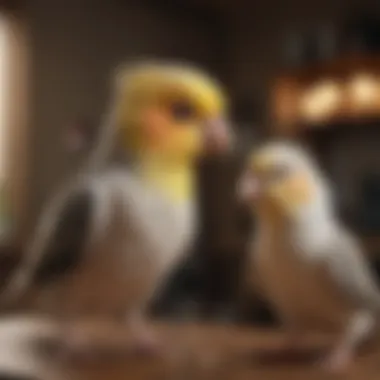
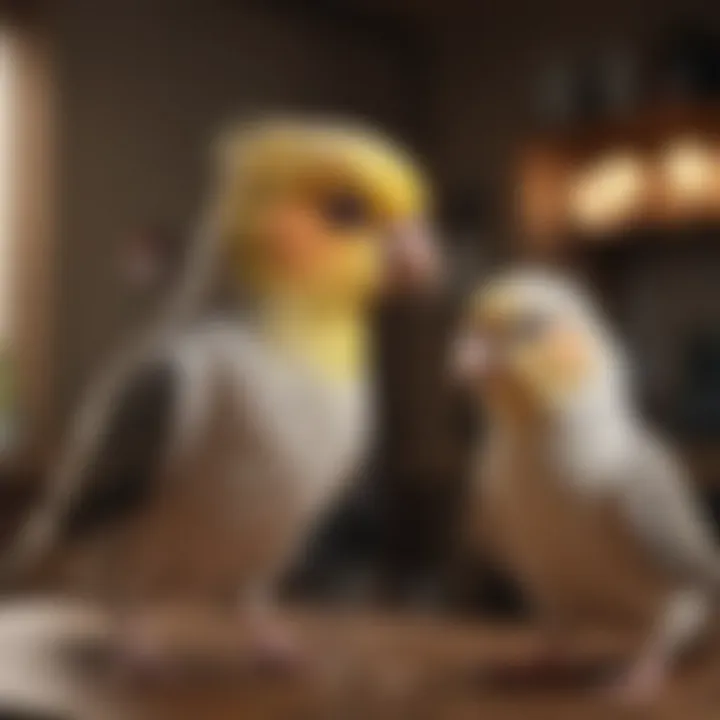
Mental Stimulation
Keeping birds also means indulging in their need for mental stimulation. Birds are intelligent creatures and can engage in various activities that challenge their minds. Providing toys that require problem-solving or puzzles that need to be figured out can help keep them alert and healthy. The act of training a bird, be it teaching them to do a simple trick or to speak, is not only beneficial for the bird’s brain but can also provide immense satisfaction for the owner.
Contribution to Well-being
Taking care of a bird offers an opportunity to practice nurturing behaviors. This responsibility can help improve one’s mental well-being as caring for another creature often brings a sense of purpose. Studies have shown that pet owners with social pets like birds experience reduced stress, anxiety, and feelings of loneliness. The simple act of watching a bird preen its feathers or dance around its cage can bring joy like no other.
Aesthetics and Environment
Additionally, birds enhance the aesthetic appeal of any home. Their colors can liven up a room, and their songs can create a tranquil ambiance. Species such as the African Grey or the vibrant Macaw are not just beautiful to look at, they're also quite capable of having simple conversations, adding another layer of interest to a household. Their presence can transform an ordinary living space into a lively environment filled with energy.
Considerations for New Owners
While the companionship of birds is appealing, it's important to weigh the commitment involved. Birds require attention, socialization, and stimulation. Not all species are equally suited for every individual. Some, like larger parrots, can be quite demanding in terms of your time and emotional investment. Therefore, potential owners should research thoroughly, understand the specific needs of the species they are considering, and be prepared to offer a fulfilling life.
Understanding Bird Behavior
Understanding bird behavior is essential for any pet bird owner. The way birds communicate, socialize, and play gives deep insights into their needs and emotions. Knowing these behaviors can help owners build a stronger bond with their feathered friends, ensuring they lead happy and healthy lives. It contributes to a better understanding of how to interact with pet birds, and promotes responsible ownership.
Communication Styles
Birds have distinct ways of expressing themselves. Unlike dogs or cats, birds often rely on vocalizations, body language, and visual displays. Parrots, for instance, may mimic sounds, while canaries might sing melodious tunes. Observing the pitch and tone of these sounds can indicate a bird's mood. When a bird puffs its feathers or raises its wings, it might be feeling threatened, while chattering cheerfully can indicate comfort and happiness. Understanding these communication styles helps owners respond appropriately to their bird's needs, fostering a supportive atmosphere.
- Vocalization: The various sounds birds make can signal different emotional states. Whether it’s a whistle of joy or a squawk of distress, being attuned to these audio cues is vital.
- Body Language: Pay attention to wing positions, tail movement, and head tilting. Birds use their bodies to express feelings.
- Facial Expressions: Although not as prominent as in mammals, some birds show emotion through slight changes in eye shape and head positions.
"Understanding how birds communicate can transform your relationship with your pet, turning it from one of mere ownership into a true companionship."
Social Needs
Birds are inherently social creatures. Many species thrive on interaction, both with their human companions and other birds. Just like humans, they derive joy and stimulation from social activities. For instance, budgerigars, or budgies, often feel more at ease and engage in playful behavior when housed with companions rather than isolated alone. This doesn’t mean every bird needs a flock, but understanding when to provide companionship is crucial.
- Companionship: Many species have a strong desire for social contact; parrots in particular can become lonely without daily interaction.
- Social Hierarchies: Birds often establish their pecking orders, especially in mixed flocks. Acknowledging these dynamics can help in multi-bird households.
- Bonding Time: Spend one-on-one time engaging with your bird through talking or interactive play to strengthen this bond.
Playing and Enrichment
Birds are intelligent animals, often requiring mental stimulation to stay content. Simply providing the basics like food and water is not enough to keep them entertained or healthy. Engaging them in play not only satisfies their natural instincts but also showcases their personalities.
- Toys: Rotate toys regularly to prevent boredom. Chewing, swinging, and foraging toys can keep a bird challenged and content.
- Interactive Play: Birds enjoy activities that let them exercise their minds and bodies. Puzzle toys where they find treats can be particularly engaging.
- Environmental Enrichment: Provide safe areas for your bird to explore. Changing the layout of their environment can also stimulate curiosity.
Understanding and responding to these behaviors doesn't just improve your bird's quality of life; it enhances the overall experience of bird ownership. With the right knowledge, pet owners can ensure their feathered companions flourish.
Choosing the Right Species
Selecting the appropriate species of bird for companionship is a cornerstone of the pet bird ownership experience. Understanding the unique characteristics of each bird can shape a fulfilling relationship and safeguard both the owner’s and the bird’s well-being. It is critical to consider not only the aesthetic appeal of a species but also its behavioral needs, social requirements, and habitat compatibility. Ignoring these elements may lead to a mismatch that can ultimately create stress for both parties involved.
When picking a pet bird, think about the following aspects:
- Space and Environment: Each species requires different space, especially when considering cage size and flight area. Some birds need ample room to spread their wings, while others can adapt to smaller spaces.
- Noise Levels: Bird calls can range from charming to borderline cacophonic. For instance, while budgies make pleasant chirps, larger parrots like macaws can be quite loud. Consider your living situation and potential noise concerns.
- Social Interactivity: Birds are social creatures. Some thrive in interaction and require more attention, while others may be more independent. This social aspect may limit your bird choice if you have a busy lifestyle.
By keenly assessing these factors, potential bird owners can align more closely with a species that fits their living situation and emotional readiness. This groundwork is crucial for fostering a long-lasting bond with our avian friends.
Small Parrots and Budgerigars
Small parrots, particularly budgerigars, are popular starter birds. They’re often recognized for their vibrant colors and engaging personalities. Budgies are social, intelligent, and relatively easy to train.
- Care Consideration: They require a diet rich in seeds, pellets, and fresh vegetables.
- Socialization: Budgerigars do better in pairs, as they are naturally social creatures.
Their small size makes them ideal for apartments or smaller homes, and they often form strong attachments to their owners—bonding through playful interactions.
Medium-Sized Birds: Conures and Quakers
Conures are known for their vivacious nature and bold personalities. They can be quite affectionate, responding to their owners' moods.
- Time Commitment: These birds thrive on engagement and stimulation.
- Diet Needs: They need a balanced diet, emphasizing pellets, fruits, and veggies.
Quakers, with their charming antics and friendly disposition, are another excellent choice. Their compact size and friendly demeanor can be particularly appealing. Conures and Quakers tend to chatter and play, which adds life and color to any home. However, potential owners should ensure they can meet the lively social needs of these birds.
The Charm of Large Parrots
Large parrots, like African Grey and Macaws, are stunning captivators. With intelligence levels akin to that of toddlers, they require significant mental stimulation and social interaction.
- High Maintenance: Their needs are extensive; they demand emotional support, space, and varied diets.
- Social Connection: These birds are communicative, often developing unique vocabularies that can mimic human speech.
While their majestic presence is alluring, owning a large parrot is a long-term commitment. They can live for over 50 years and develop profound emotional bonds with their owners.
Non-Parrot Species: Finches and Canaries
Not every bird enthusiast wants the interactive relationship that parrots offer. Finches and canaries provide beautiful melodies and lively colors without the same level of interaction.
- Independent Spirits: These birds enjoy being kept in flocks, so it’s advisable to keep them in pairs or groups, as loneliness can be an issue.
- Minimal Training: Unlike parrots, finches and canaries generally don’t require complex training or social interaction.
Their care mainly revolves around a proper diet and hygiene, and they can thrive well in spacious cages with room to fly.
In summary, choosing the right bird species is more than just a casual decision — it’s about compatibility with lifestyle, commitment, and understanding the nuances of different bird types. Aligning your personal needs and circumstances with the right species fosters a healthy, thriving avian companionship.
Creating a Suitable Habitat
Setting up a proper habitat for your pet bird is of utmost significance. Housing directly impacts the bird's health, behavior, and overall happiness. Birds, unlike cats or dogs, can’t tell you when they feel cramped or unsafe, so it’s essential to consider their needs meticulously. A well-planned environment fosters their physical well-being and enriches their lives, allowing them to flourish and act naturally.
Selecting the Right Cage
Choosing a cage is not merely about aesthetics; it should also be spacious enough for the bird to move freely and comfortably. Consider the size and species of your bird. Larger birds such as macaws require sizable cages to stretch their wings properly. The general guideline is that your bird should be able to fully extend its wings without hitting the sides.
A good cage has several essential features:
- Bar Spacing: For smaller birds, make sure bar spacing is narrow enough to prevent escapes or injuries.
- Shape and Layout: Cages that are broader rather than tall often suit birds better. They can fly across and explore rather than just up-down movement.
- Accessible Doors and Trays: Ease of access for cleaning and feeding ensures maintenance is a breeze.
Providing various levels within the cage can also be beneficial, creating different spaces where a bird can perch or climb.
Perches and Accessories
Birds love to climb and perch. Providing a variety of perches enhances their comfort and keeps them engaged. Using natural wood perches is a great way to mimic their natural habitat. These are often of different diameters and textures, which help maintain their foot health.
When considering accessories, think about:
- Toys: Offer a mix of chewing, foraging, and interactive toys to stimulate their minds. Birds are playful creatures, and boredom can lead to destructive behavior.
- Food and Water Dishes: Position these for easy access while ensuring they are secure enough to prevent messes.
- Bathing options: Birds often enjoy splashing around. A shallow dish of water can add fun during their day and help with feather maintenance.
Safe Outdoor Spaces
Creating a safe outdoor area for your bird can drastically improve their quality of life. Fresh air and sunlight are excellent for birds, but you must consider safety first. Unsupervised outdoor time can lead to unfortunate events such as predation or escape.
Some ideas for safe outdoor experiences include:
- Birdproofed Balconies or Patios: Make sure all exits are secured. Offering a space where birds can enjoy fresh air is fantastic for their well-being.
- Walk-in Aviaries: If space allows, a flighted outdoor enclosure can be a sanctuary. Birds can fly, sunbathe, and exhibit natural behaviors within a secure environment.
- Harness Training: If your bird is comfortable with it, harness training can allow safe outdoor excursions with a human caretaker.
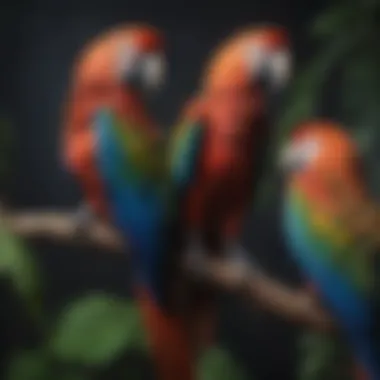
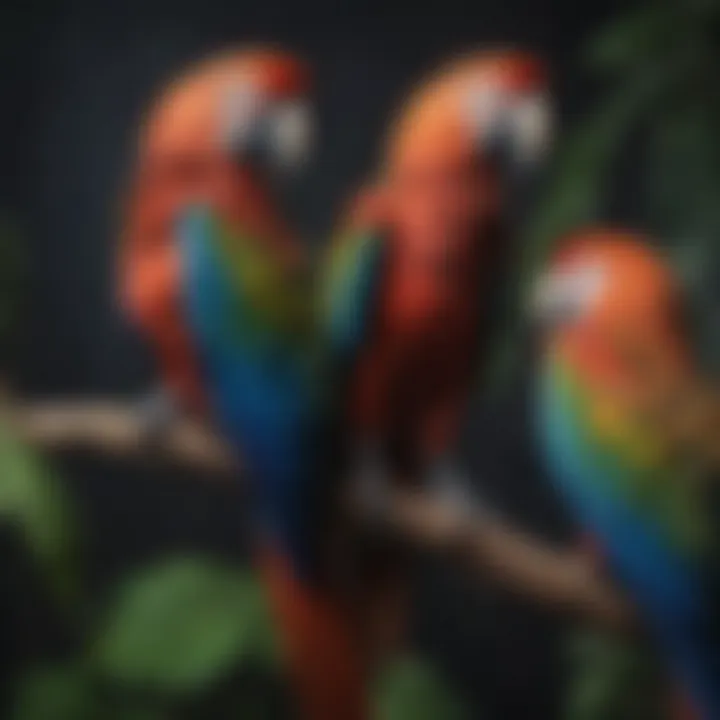
"A well-planned environment fosters their physical well-being and enriches their lives, allowing them to flourish."
By addressing these essential elements, you increase not just the quality of life for your bird but also strengthen your bond with them. Creating a suitable habitat ultimately allows your feathered friend to feel safe, secure, and happy in its surroundings.
Nutritional Needs
When it comes to taking care of pet birds, one cannot underestimate the importance of proper nutrition. Just like humans, birds thrive on a balanced and varied diet that caters to their specific needs. Ensuring that your feathered companion gets the right nutrients not only enhances their well-being but also boosts their energy levels, vibrant feather colors, and overall longevity. A well-fed bird is generally a happy bird, and as a bird owner, you certainly want to promote the best life possible for your little friend.
Understanding Avian Diets
Birds, depending on their species, come with unique dietary requirements that are indispensable to their health. Generally, their diet can be broken down into a few category. Here are the three main types that most birds should have:
- Seeds: While birds naturally love seeds, it’s essential to know that they should not be the sole component of their diet. Seeds can be high in fat and low in crucial vitamins and minerals, which might lead to health problems like obesity in the long run.
- Pellets: Most avian experts recommend a pellet-based diet as a primary food source. These pellets are specially designed to deliver a balanced nutritional profile. They help to prevent selective feeding common with seed diets, where birds pick and choose their favorite seeds, leaving out the essential ones.
- Fresh Fruits and Vegetables: Like cherry on top, fresh produce adds not just flavor but also moisture and vital vitamins. Dark leafy greens like kale and romaine, along with fruits like apples, berries, and bananas, can be fantastic additions to a bird's meal plan. Always wash them and serve in small manageable pieces.
It’s also worth noting that different birds have different preferences, so observing what your bird enjoys can help tailor its diet to its liking.
Homemade vs. Commercial Diets
There’s an ongoing debate among bird owners about whether to feed their pets homemade meals or rely on commercial bird food. Each approach has its own advantages and drawbacks:
- Homemade Diets: Some owners enjoy whipping up fresh meals for their birds using wholesome ingredients. When done right, this can nourish your bird with natural foods like grains, beans, and vegetables. The downside? It takes time and a level of understanding of nutrition to ensure the meal is balanced. If you don't do proper research, you might end up with a diet that lacks essential elements.
- Commercial Diets: On the flip side, packaged bird food makes feeding easier. Brands design these foods with a balanced mix of essential vitamins and minerals, cutting down the guesswork. However, some commercial diets can be filled with fillers and preservatives, so it's critical to choose high-quality products. Reading labels is non-negotiable here!
Given these points, you could even consider a combination of the two methods—a base of pellets complemented by fresh, homemade options.
Supplements and Treats
Sometimes, even the best diets need a little booster. This is where supplements come into the picture. They can help address specific health concerns or dietary gaps:
- Calcium Supplements: Important for all birds, especially laying hens, to prevent deficiencies and promote strong bones.
- Multivitamins: A daily vitamin can benefit those finicky eaters that might not consume a full range of nutrients.
- Treats: Treats can be great for bonding but should be used sparingly. Options such as millet spray, unsalted nuts, or even bits of cooked pasta can provide a tasty reward during training.
Here’s a tip: Consult with a veterinarian specializing in avian care before introducing any new supplements. They can give you tailored advice based on your bird’s unique needs.
"Making informed decisions about your bird's diet is not just about feeding; it’s about nurturing a bond built on health, happiness, and longevity."
Understanding and implementing the right nutritional needs will set the foundation for a thriving pet bird, aligning their diet with their natural instincts while also ensuring their health and happiness.
Health Care Essentials
When it comes to owning a pet bird, ensuring their health is as important as providing a comfortable habitat and a balanced diet. The essence of health care for birds revolves around regular check-ups, understanding potential health issues, and being vigilant about any signs of illness. Each of these components plays a critical role in fostering not just longevity but also a high quality of life for our avian companions.
Regular Veterinary Check-ups
Birds are unique creatures with distinct health needs. Unlike dogs or cats, they tend to mask their illnesses until they become severe. Therefore, regular vet visits are crucial. Skimming over check-ups can lead to missed opportunities for early detection of problems. Ideally, a bird should visit an avian vet at least once a year.
During a check-up, your vet will look for obesity, feather conditions, and any subtle signs of distress. Tests might include blood work or even drop a few feathers for analysis. Moreover, talking with a vet helps in understanding specific health concerns for their species. For instance, budgerigars often face respiratory issues, while larger parrots may be prone to liver disease.
"An ounce of prevention is worth a pound of cure." This old saying couldn’t ring more true when it comes to bird health.
Common Health Issues in Pet Birds
Pet birds can face a range of health challenges. Understanding these issues not only helps owners to be proactive but also allows them to establish a routine that limits risks. Here are some prevalent health concerns:
- Psittacosis: Often known as parrot fever, it is an infectious disease that can affect not just birds but also humans.
- Beak and Feather Disease: This viral disease affects the feathers and beak, leading to serious health implications if not addressed.
- Obesity: A common issue brought on by poor dietary choices or lack of exercise, leading to various complications.
- Respiratory Infections: Some species are particularly susceptible to these, which can stem from exposure to aerosolized particles or drafts.
Staying informed about these issues is the best way to give your bird a fighting chance against them.
Signs of Illness to Watch For
Birds are often stoic creatures, so being attentive to even the slightest changes in their behavior is vital. Common signs of illness include:
- Change in Appetite: If your bird suddenly starts eating less or refuses food, it might indicate a problem.
- Altered Droppings: A sudden change in the consistency or color should prompt a vet visit.
- Fluffed Feathers: A bird that is constantly puffed up may be trying to maintain warmth due to illness.
- Lethargy: A reduction in energy or a lack of interest in activities could be a red flag.
- Abnormal vocalization: Changes in vocal patterns can signal distress or discomfort.
Being proactive and observant can make a world of difference in your bird’s health care journey. It’s about forging a bond between you and your feathery friend while ensuring they lead a healthy life.
Training Your Bird
Training your bird is not just a mundane task; it's a crucial part of building a harmonious relationship with your feathered friend. A well-trained bird is typically more manageable, has improved communication skills, and enjoys a more stimulating life. Training can enhance the bond between you and your pet, transforming the way you interact and coexist. Just like humans, birds benefit from clear expectations and routine. Owners often find that consistent training leads to better behavior and a more enjoyable pet experience.
Building Trust Through Socialization
Achieving successful training often begins with nurturing trust through socialization. Birds, by their nature, are meant to be social creatures. Engaging them in regular interaction helps in a few key areas:
- Familiarity: Exposure to various environments, sounds, and people can reduce fear in your bird. It’s like slowly introducing them to the hustle and bustle of life.
- Enrichment: Birds thrive when stimulated. Socialization can come through supervised visits or even playful exploration of different spaces within your home.
- Bonding: Regular, thoughtful interaction strengthens the emotional connection. Investing time in this aspect pays off in terms of training responsiveness!
Start by allowing your bird to observe you from a distance, gradually working towards closer interactions. Positive reinforcement, such as treats or gentle words, can solidify the trust they're beginning to feel.
Basic Commands and Tricks
Once trust is established, introducing basic commands and tricks can be an enjoyable process for both pet and owner. This aspect of training does more than merely teach your bird skills; it also provides mental stimulation, making their time with you much more enriching. Some popular commands include:
- Step Up: A critical command. It allows owners to manage movement without causing stress.
- Come Here: Encourages your bird to return to you, reinforcing the bond.
- Wave: A fun trick. With a little patience, many birds can learn to raise their foot and wave it.
Using a clear tone and consistent gestures will lead to quicker learning. Patience, of course, is the name of the game here. Celebrate small victories with praises or treats; these small acknowledgments make a significant impact.
Addressing Behavioral Issues
Even the most loving birds can develop behavioral quirks that might require a bit of fixing. Addressing these issues early on can prevent them from escalating. Here are a few common behaviors to watch for:
- Nipping or Biting: Often a sign of fear or territoriality. Learning to recognize stress signals can help in preventing this.
- Screaming: While vocalization is natural, excessive noise can be disruptive. Understanding what triggers this behavior will help in managing it effectively.
- Feather-plucking: A more severe issue often linked to stress or boredom. Providing adequate enrichment and reducing stressors are essential steps in combatting this.
Using a positive reinforcement approach to redirect undesired behaviors often proves effective. That way, rather than scolding when something goes wrong, you can reward the good behaviors to encourage them further.
"Training is not merely a matter of commands but a means of nurturing a bond that celebrates mutual respect and affection."
Bird training isn’t merely an exercise; it’s an essential part of avian ownership that offers profound rewards. As any dedicated bird owner will tell you, the journey of training your bird requires patience, understanding, and a willingness to adapt. Embrace the process, celebrate progress, and above all, enjoy the companionship that develops along the way.
Emotional Bonds Between Birds and Owners
Establishing a strong emotional connection with pet birds is not just a whimsical notion; it is at the heart of fulfilling bird ownership. When a bird and its owner share an emotional bond, it enhances the overall experience of having a feathered companion. This bond can greatly impact the bird's well-being, behavior, and even its lifespan. Owners often notice their birds are more sociable, playful, and active when they feel secure and cherished in their environment.
Understanding Attachment Styles
Birds, like other pets, exhibit various attachment styles towards their owners. Recognizing these styles can greatly enhance the relationship. Some birds, such as budgerigars, might show signs of affection by preening or cuddling close to their owner. Others, like African greys, may display more independent traits but can still forge deep emotional connections. Understanding these behaviors is crucial. It allows owners to tailor their interaction to meet the bird's emotional needs, whether that means giving them space or showering them with affection.
- Secure Attachment: Typically seen in well-socialized birds. They seek and enjoy interaction but feel comfortable exploring their habitat when alone.
- Insecure Attachment: Usually results from a bird’s past trauma or lack of socialization. These birds may be skittish, avoiding contact but still require a gentle approach to build trust.
- Avoidant Attachment: This style is characterized by the bird's tendency to keep its distance, often needing more patience and encouragement from the owner.
Understanding these attachment styles is paramount for building a loving relationship. Consistent, positive interaction and gentle guidance can help foster secure attachments over time.
The Impact of Interaction on Well-being
The interaction between birds and their owners goes beyond mere companionship. It can significantly influence the mental and emotional health of the bird. Engagement breeds confidence, fostering a happier and healthier pet. Regular interaction helps in stimulating a bird's mind, which is key for preventing boredom-related behaviors like feather plucking.
- Quality Time: Spending quality time with your bird can reinforce your bond. Whether it’s through simple games, talking, or singing, each interaction builds trust.
- Positive Reinforcement: Using treats and praise during training sessions or play can encourage good behavior and enhance the emotional bond.
- Understanding Body Language: Like humans, birds express emotions. When owners learn to recognize their bird's body language—such as ruffled feathers or an anxious posture—they can respond appropriately, fostering trust and emotional security.
"Emotional connections don't just create happy birds; they contribute to a fulfilling companionship, one that can change both the bird's and the owner's life for the better."

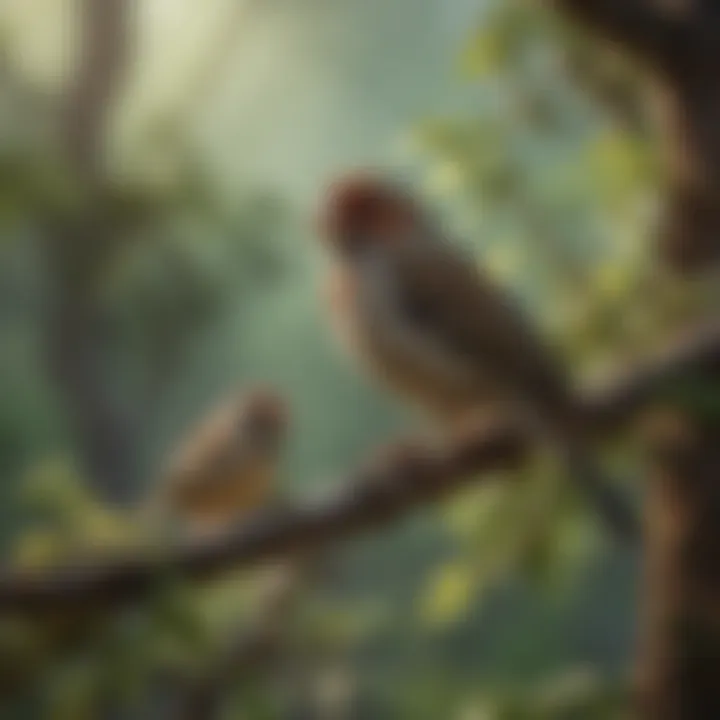
The Role of Enrichment
When it comes to keeping pet birds, enrichment plays a vital role in their overall happiness and well-being. Birds, much like humans, require mental and physical stimulation to thrive. Engaging them suitably not only prevents boredom but also encourages a healthier lifestyle. Each bird has its own unique personality and preferences; thus, creating an environment that caters to these needs can be both a rewarding and enjoyable journey for bird owners.
Creating enrichment opportunities for birds requires an understanding of their natural behaviors and instincts. Birds in the wild spend a significant chunk of their day foraging, flying, and socializing. Replicating this in a domestic setting helps satisfy their intrinsic desires. Without proper enrichment, you might find your feathered friends displaying undesirable behaviors, such as excessive vocalization or destructive tendencies.
Physical and Mental Stimulation
Physical and mental stimulation are two sides of the same coin when it comes to enriching a bird's life. Let's break this down a bit.
- Physical Stimulation: Birds are energetic creatures that need space to fly and play. If your pet bird has limited room to move, their physical health may decline. Providing ample space, along with various perches and play areas, allows your bird to stretch its wings and keep fit. Quilty, for life, some species like cockatiels and budgerigars love to move around.
- Mental Stimulation: This is just as crucial. Birds are intelligent, and they simply won't thrive if left to their own devices with nothing to engage their minds. Activities that challenge them, like puzzles, hidden treats, or new toys, can promote cognitive skills. These activities prevent your bird from languishing in monotony while also stimulating their natural instincts.
To summarize, both physical and mental enrichment can boost your bird's happiness, leading to a longer and healthier life.
Interactive Toys and Games
Interactive toys and games offer a delightful way for birds to engage in play while learning. These types of toys can vary widely, but the emphasis should always be on those that encourage exploration and challenge.
- Types of Interactive Toys: Think about toys that allow your bird to think critically. For example, a wooden puzzle that requires them to use their beak and claws to reach a hidden treat can keep them occupied for hours. Other examples include swinging toys or climbing structures that prompt your bird to figure out the best path to their goal.
- Game Time:
- Hide and Seek: Hiding treats around their habitat encourages them to explore; it’s both exciting and rewarding.
- Color Games: Use colored objects for them to recognize different shades, stimulating both mind and sight.
"Interactive play not only sharpens your bird's mental faculties but also strengthens the bond between you and your feathered companion."
Challenges of Bird Ownership
Owning a pet bird can be a rewarding experience, but it isn’t all chirps and feathers. Each bird comes with its own set of challenges that potential owners should be acutely aware of. This section aims to illuminate some of the most significant hurdles that exist in the world of avian ownership. By understanding these challenges, bird owners can better prepare and develop strategies to create a harmonious living environment for both them and their feathered companions.
Time and Commitment Considerations
Time is the currency of successful bird ownership. These creatures need more than just food and water; they crave interaction, training, and stimulation. Birds can live a long time, sometimes decades, depending on the species. Hence, before bringing one into your home, it’s crucial to evaluate your current situation.
- Daily Interaction: Many birds are social and will require engagement every day. If you have a hectic lifestyle or frequently travel, you may find it tough to meet these social needs.
- Feeding and Care: Preparing fresh food, cleaning cages, and ensuring access to clean water all consume time. Owners should allocate specific periods of their daily schedule for these essential tasks.
- Training Sessions: Training your bird not only enriches its life but also strengthens the bond you share. Short sessions can add up over the week, transforming how you interact with your bird.
Ultimately, being honest with yourself about how much time you can commit will save both you and the bird from stress or disappointment. The last thing anyone wants is a lonely bird that feels neglected or a frustrated owner unsure of how to manage.
Travel and Socialization Challenges
Travel plans often stir up complications for bird owners. Birds thrive on routine, and any disruptions can lead to stress. Here’s where the waters get murky for many:
- Finding Care: For short trips, it’s essential to have reliable bird sitters or even boarding facilities. Not all caretakers are equipped to handle birds, and leaving them in the wrong hands can lead to mishaps.
- Moving House: If you happen to be the traveling kind, consider how your bird will adjust. Rehoming or shifting to new environments can stress birds, making acclimation challenging.
- Socialization: While bringing your feathered friend along might sound tempting, not all locations are bird-friendly. Taking your pet to social gatherings requires timely precautions. It may not only be challenging but also downright unsafe for your bird.
"Understanding a bird’s personality and social needs can mean the difference between a happy companion and a stressed-out one."
In summary, thinking ahead about time commitments and travel plans is vital. Owners should strive for a balance—protecting their commitments while still being a dutiful bird parent, ensuring their pet feels loved and engaged even when life gets busy.
Understanding Bird Personalities
Birds are more than just pretty feathers and chirping sounds; they have unique personalities that can greatly influence how they interact with their owners and their environment. Understanding these personalities is crucial for providing a nurturing atmosphere for your feathered friends. It can make a world of difference in ensuring a harmonious relationship between pet birds and their owners. Some birds may require more social interaction than others, while some may prefer their solitude. This knowledge allows owners to cater their approaches and be more attuned to the needs of their pets, leading to a happier bird and, ultimately, a happier owner.
Identifying Species-Specific Traits
Every species of bird has its own quirks and common traits, and familiarizing yourself with these can simplify your journey as a bird owner. For instance, cockatiels are known for their sociable and affectionate nature, often enjoying the company of their humans, while finches tend to be more independent and prefer to socialize with their own kind rather than people. Here’s a list of a few popular pet birds and their specific traits:
- Budgerigars: Playful and social, these little guys are often described as clowns of the bird world.
- African Grey Parrots: Highly intelligent, they are skilled mimickers and often bond closely with their owners but can be demanding.
- Canaries: Generally more solitary, these birds are known for their beautiful singing, often thriving in calm environments.
Understanding these traits not only helps with choosing the right bird but also allows owners to set realistic expectations and interact appropriately with their pets.
Bird Types and Owner Compatibility
Choosing a bird is a significant decision, one that requires a clear understanding of compatibility between the bird's personality and the owner’s lifestyle. For example, if someone is a busy professional with limited time, a bird that thrives on social interaction, such as an Amazon parrot, may not be an ideal fit. On the other hand, birds like canaries or finches, which are more independent, can do fine without much human interaction, as long as they have a mate or companions of their own kind.
Furthermore, household dynamics play a crucial role too. A family with young children may find that larger, more playful birds, like cockatoos, could mesh well with the energy found in a bustling home. So it’s vital to assess personal situations carefully. Prominent traits of popular birds can guide potential owners in making informed choices:
- Aggression or Affection: Some birds, like cockatoos, can be affectionate but may show aggression if not socialized properly.
- Noise Levels: Certain species, especially larger parrots, can be quite loud and might not suit quieter living spaces.
- Activity Levels: High-energy birds need stimulation and interaction, while others may prefer quiet time.
Ultimately, considering both species traits and personal compatibility ensures a better match and promotes long-term happiness for both birds and their owners.
Resources for Bird Owners
Navigating the rewarding yet intricate world of pet birds requires both knowledge and support. As a bird owner, you may find yourself facing challenges and needing guidance on various aspects of bird care. Thus, having access to reliable resources can be invaluable. These resources can serve not just as a wellspring of information, but also as a community where you can connect with fellow enthusiasts who share your passion for avian companionship.
Books and Articles for Further Reading
The written word has always been a solid foundation for learning. Books and articles dedicated to pet birds provide extensive insights into their care, behavior, and training. Some notable authors in this niche, like Diana L. G. G. B. and Anne M. H. R., delve into species-specific traits and needs, effectively enlightening both novice and seasoned bird caregivers.
Beyond general guides, specialized literature on nutrition and health care can offer a more in-depth look at your specific bird species. For instance, a book focusing solely on African Grey parrots or finches can equip you with tailored tips that a general book might miss.
While there are countless articles online, it’s best to choose content from reputable sources. A well-curated list of suggested readings might include:
- The Cockatoo Handbook by J. L. McGowan
- The Parrot Problem Solver by Michael Sazhin
- Articles on reputable sites like Britannica or Wikipedia
These reading materials can improve understanding and enhance the overall experience you have with your feathered friend.
Online Communities and Forums
In addition to books, online communities offer invaluable support. On platforms like Reddit and Facebook, groups centered around bird ownership are abundant. Here, you can share experiences, ask questions, and even seek advice for those tricky situations that only a bird owner can appreciate.
For instance, in a subreddit dedicated to pet birds, you might find threads discussing everything from choosing the right diet to dealing with common behavioral issues. Connecting with both novice and expert owners can provide a wealth of information.
Some popular online forums include:
- r/Parrots on Reddit: A community for all bird lovers, focusing on care and health discussions.
- Bird Breeders and Bird Lovers (Facebook Group): A place to connect with other enthusiasts and breeders.
These communities often feel like a second home, offering insight and companionship that can only enrich your journey as a bird owner.
Having these resources at your disposal ensures you’re not just flying blind. Whether it’s literature or the shared experience of others, the tools you gather will not only inform your decisions but also help build a fulfilling relationship with your avian companion.
Closure
In any exploration of the best pet birds, it’s essential to wrap things up by understanding the importance of what we’ve discussed. The relationship between humans and avian companions isn’t just a simple pet ownership tale; it's more of a unique partnership that nurtures the soul.
Birds bring a world of nuance into our lives, with their distinct personalities, vocalizations, and, of course, their beautiful feathers. Every species and individual has traits that can captivate and enchant us. It’s these individual traits that often guide our choices as potential bird owners.
Caring for a pet bird involves much more than simply feeding it seeds or placing it in a cage.
Key Elements to Remember:
- Habitat Considerations: A well-rounded setup is key. This means not just the right size cage, but also perches, toys, and places to explore. Birds thrive in environments that mimic natural habitats, which leads to healthier and happier pets.
- Nutritional Needs: Just like humans, birds have varied diets. Understanding the balance of pellets, seeds, fresh fruits, and vegetables can dramatically affect their well-being. A bird nourished right often shows its health through vibrant colors and active behavior.
- Social Connection: Birds are inherently social creatures. Establishing a bond through quality time, interaction, and training creates not just a tamer bird, but often a lifelong friend.
"Pet birds teach us the importance of patience, understanding, and unconditional love. Each interaction is a lesson in empathy and companionship."
Benefits of Being an Informed Owner
Every bit of information you gather ultimately helps in making informed decisions. Familiarizing yourself with various species, their personalities, and their needs ensures that you're not just choosing a bird on a whim, but are becoming a diligent, caring owner. The love and joy these creatures bring into our lives come with responsibilities that should not be taken lightly.
Considerations for the Future
As we conclude this guide, remember that the journey doesn't stop with acquiring a bird. Seasonal health checks, ongoing socialization efforts, and cognitive stimulation through play all contribute to a bird’s overall happiness. Also don't forget the value of learning from other bird parents through communities, both online and in-person. Places like reddit.com and facebook.com can serve as platforms for shared experiences, advice, and companionship.
Ultimately, the aim is to foster a fulfilling and mutually enriching relationship. The more we invest in understanding our feathered friends, the more joy they bring into our daily lives.















